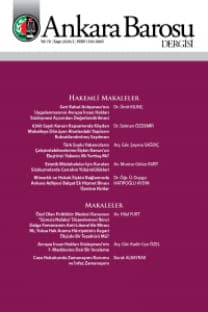Türk Ceza Kanunu’nda Taksir
Suç teorisine göre, tipe uygun ve hukuka aykırı bir eylemin yapılmış olması failin sorumluluğu için yeterli değildir. Failin söz konusu eylemi gerçekleştirirken kusurlu olması da gerekir. Kusura dayanan sorumluluk anlayışı ile bağdaşmayan objektif sorumluluk anlayışı 5237 sayılı yeni Türk Ceza Kanunu (TCK) ile terk edilmiş bulunmaktadır. Failin, öngörülebilir bir sonucu öngörmemesi esasına dayanan taksir, 765 sayılı TCK’da tanımlanmamış olmasına karşın, yeni TCK m.22/2’de bir tanıma kavuşturulmuştur. Kusurluluğun bir türü olan taksir, istisnai bir nitelik taşıdığından taksirli bir hareketin cezai sorumluluk doğurabilmesi için bu durumun kanunda açıkça düzenlenmiş olması gerekir. Esas itibariyle Türk Ceza Kanunu’nda taksirin ele alındığı bu çalışmada, konunun daha sistematik bir şekilde ortaya konulabilmesi amacıyla, ana hatlarıyla kusurluluk kavramı, kusurluluğun esasını açıklayan teoriler ve kusur yeteneği konuları da izaha çalışılmıştır.
Anahtar Kelimeler:
Kusurluluk, taksir, öngörülebilme, nedensellik bağı, sorumluluk.
Negligence Under The Turkish Criminal Code
In criminal theory, for responsibility of the perpatrator, it is not sufficient that the activity, which is committed is in line with the type of crime and is in bearch of law. The perpetrator must have negligence for commiting such criminal activity. The objective liability approach contradicting negligent liability approach has been abondened in the new Turkish Penal Code numbered 5237. Negligence, which failure of expectation of something that should be expected, and which was not defined in the old Penal Code numbered 765 is now defined in Article 22(2) of the Penal Code. Negligence is a kind of fault and is of exceptional nature must be defined in a law in order to cause criminal responsibility for its exceptional nature. This study mainly deals with negligence under the Turkish Criminal Code. In order to present the subject systematically, the concept of negligence in broad terms, theories explaining basis of negligence and adequacy for negligence is also explained.
Keywords:
Keywords: Faultiness, negligence, expectability, causality, responsibility.,
- ISSN: 1300-9885
- Yayın Aralığı: Yılda 4 Sayı
- Başlangıç: 1942
- Yayıncı: Ankara Barosu Başkanlığı
Sayıdaki Diğer Makaleler
İnsan Hakları Açısından Hükmün Açıklanmasının Geri Bırakılması
TEBLİGAT KANUNU’NUN 20. MADDESİ ÜZERİNE DÜŞÜNCELER
DEVLET HİZMETİ YÜKÜMLÜSÜ TABİPLER NE YAPMALI?
Çalışanların İş Sağlığı ve Güvenliğine İlişkin Haklarında Yeni Düzenlemeler
İş Hukukunda Geçersiz Feshin Sonuçları
Kamu Hizmetlerinde Biçimsel Ölçütte Çözülme ve Anayasa’nın 128. Maddesinin I. Fıkrası
Avrupa Birliği Müktesabatında Yabancıların Aile ve Özel Hayat Hakkı Çerçevesinde Korunması
